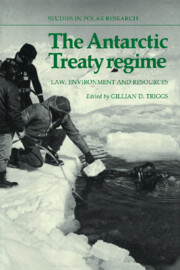Book contents
- Frontmatter
- Contents
- List of contributors
- List of Antarctic Treaty Parties
- Foreword
- Introduction
- Frontispiece: Map of national claims
- Part I Antarctica: physical environment and scientific research
- Part II The Antarctic Treaty regime: legal issues
- Part III The Antarctic Treaty regime: protecting the marine environment
- 9 Introduction
- 10 The Antarctic Treaty system as a resource management mechanism
- 11 Regulated development and conservation of Antarctic
- 12 Recent developments in Antarctic conservation
- 13 Environmental protection and the future of the Antarctic: new approaches and perspectives are necessary
- Part IV The Antarctic Treaty regime: minerals regulation
- Part V Whither Antarctica? Future policies
- Part VI Conclusion
- Selected reading
- Appendix 1
- Appendix 2
11 - Regulated development and conservation of Antarctic
Published online by Cambridge University Press: 20 January 2010
- Frontmatter
- Contents
- List of contributors
- List of Antarctic Treaty Parties
- Foreword
- Introduction
- Frontispiece: Map of national claims
- Part I Antarctica: physical environment and scientific research
- Part II The Antarctic Treaty regime: legal issues
- Part III The Antarctic Treaty regime: protecting the marine environment
- 9 Introduction
- 10 The Antarctic Treaty system as a resource management mechanism
- 11 Regulated development and conservation of Antarctic
- 12 Recent developments in Antarctic conservation
- 13 Environmental protection and the future of the Antarctic: new approaches and perspectives are necessary
- Part IV The Antarctic Treaty regime: minerals regulation
- Part V Whither Antarctica? Future policies
- Part VI Conclusion
- Selected reading
- Appendix 1
- Appendix 2
Summary
Introduction
The title of this chapter appears to imply that Antarctic resources must be developed. This is by no means a unanimous view. Many people regard preservation of the present regime of peaceful scientific cooperation on the vast continent south of latitude 60° S as of so high a priority, and prospects of worthwhile development of new resources there (especially mineral resources) as so remote, that they are willing to forego all proposals for development in order to preserve the gains that have been made under the Antarctic Treaty. Linked with this view, is a feeling that the Antarctic Treaty is a fragile instrument, liable to crack under the strain of competitive commercial pressure.
Although, like most people who have worked in the Antarctic, I would number myself among those who would prefer not to see any part of its magnificent environment disrupted by mining or by the construction of associated bases, for the purposes of this chapter I am going to assume that mineral resource development and, indeed, the continued development of other living and non-living environmental resources of the region, remain possibilities. I believe this is a realistic assumption, given that the Antarctic Treaty Consultative Parties have already agreed upon a series of measures to conserve the resources and environment of the region and to regulate activities that might damage it, and are currently engaged in discussions about the content of a regime to control mineral exploration and exploitation.
- Type
- Chapter
- Information
- The Antarctic Treaty RegimeLaw, Environment and Resources, pp. 128 - 142Publisher: Cambridge University PressPrint publication year: 1987
- 2
- Cited by



